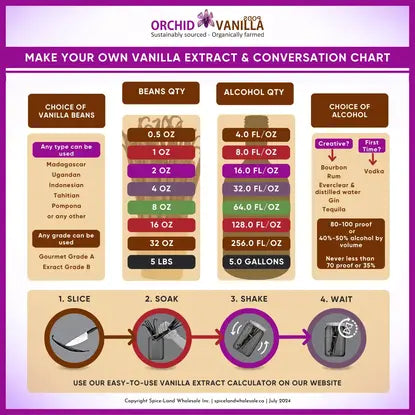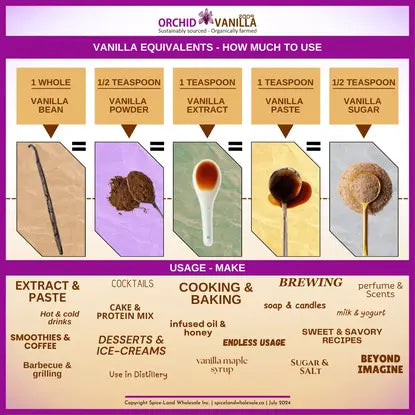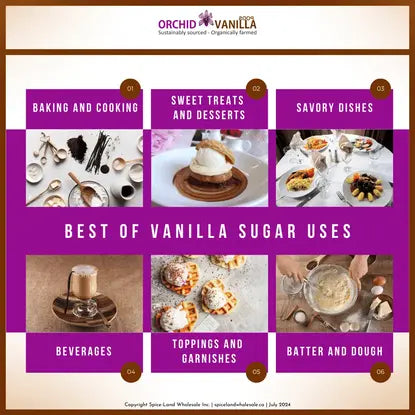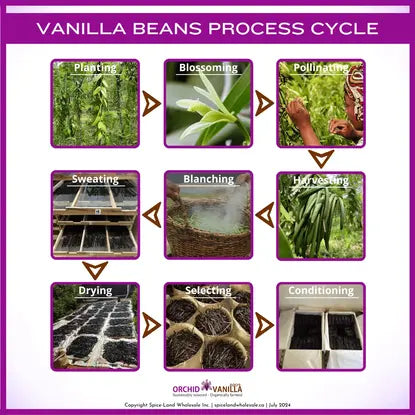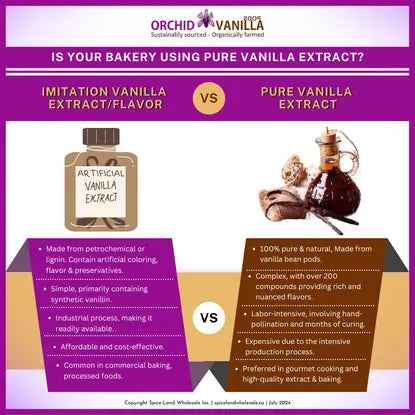
Imitation Vanilla vs. Pure Vanilla Extract: What’s the Difference?

When it comes to baking, choosing the right ingredients can significantly affect the flavor and quality of your creations. Vanilla, a staple in many recipes, plays a key role in enhancing the taste of baked goods. But not all vanilla products are created equal. The debate between imitation vanilla and pure vanilla extract often arises, especially for bakers striving for the best results. In this post, we’ll explore the differences between these two options and why the choice you make matters for your bakery.
What is Imitation Vanilla?
Imitation vanilla, also referred to as artificial vanilla extract, is a synthetic product designed to mimic the flavor of real vanilla. It is primarily composed of synthetic vanillin, which can be derived from petrochemicals or lignin (a byproduct of wood pulp processing). While it offers a more affordable alternative to pure vanilla extract, it lacks the depth and richness found in the natural version.
- Composition: Imitation vanilla is primarily made of synthetic vanillin, lacking the additional 200+ compounds that give real vanilla its complexity.
- Production: Manufactured through industrial processes, imitation vanilla is designed for mass production, which reduces costs significantly.
- Cost: Due to its synthetic nature, imitation vanilla is much more affordable and is often used in commercial baking and processed foods where cost-efficiency is essential.
What is Pure Vanilla Extract?
Pure vanilla extract, in contrast, is made from real vanilla beans and is a natural product. Its production process involves cultivating vanilla orchids, hand-pollinating them, harvesting the pods, and curing them over several months to develop the complex flavors we know and love.
- Composition: Pure vanilla extract contains over 200 flavor compounds, which result in a rich, deep, and layered taste that cannot be replicated by synthetic vanillin alone.
- Production: The process is labor-intensive and includes curing vanilla beans to extract their full flavor. This attention to detail is reflected in the quality of the final product.
- Cost: The lengthy and intricate process of producing pure vanilla extract makes it more expensive, but the superior flavor it provides is highly valued in gourmet cooking and high-quality baking.
Why the Choice Matters for Your Bakery
If your bakery focuses on quality and flavor, using pure vanilla extract can elevate your baked goods by providing a more authentic and rich taste. While imitation vanilla may save costs, particularly in large-scale production, it often lacks the complexity and aroma that make vanilla a standout ingredient.
Here’s why choosing pure vanilla extract might benefit your bakery:
- Flavor: Pure vanilla extract offers a multi-dimensional flavor profile that enhances the richness of cakes, cookies, and pastries. Customers will notice the difference.
- Reputation: By prioritizing quality ingredients, your bakery can establish a reputation for excellence. The flavor depth of pure vanilla extract can set your products apart.
- Customer Satisfaction: In a competitive market, offering premium quality with natural ingredients can lead to higher customer satisfaction and loyalty.
Conclusion
The choice between imitation vanilla and pure vanilla extract ultimately depends on what your bakery values most. Imitation vanilla may be a cost-effective option for large-scale operations, but if you aim for quality, authenticity, and a superior taste, pure vanilla extract is worth the investment. Your decision will reflect in the taste and quality of your baked goods, influencing your bakery’s reputation and customer satisfaction.



